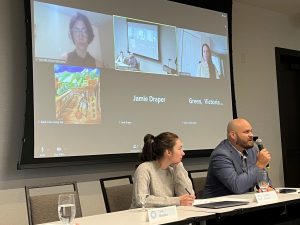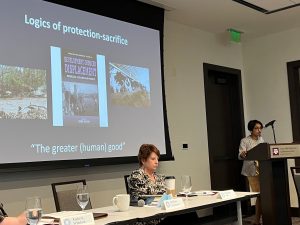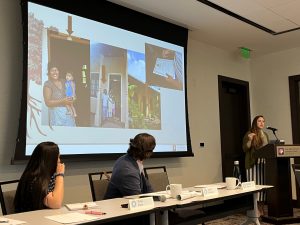Planetary Health and the Humanities Conference Report
March 31st and April 1st, 2022
Texas A&M Hotel and Conference Center
To view recordings of this event, please visit our media page here.
Growing concerns over environmental degradation and the effects of climate change and habitat loss have led to emerging cross-disciplinary research into the direct impacts of environmental decline on health in relation to human and more-than-human ecologies. On March 31st and April 1st, the Glasscock Center for Humanities Research hosted a two-day conference, Planetary Health and the Humanities. This conference was a joint effort between the Glasscock Center’s Global Health Humanities and Humanities: Land Sea Space initiatives and aimed to further scholarship, teaching, as well as a general understanding of the connections between ecological health and human health. Planetary Health is a novel area of study, and this international conference was one of the first of its kind to use humanistic ideas and methods to explore the topic.
The event kicked off on March 31st, with a keynote address presented by Professor Nancy Tuana (Philosophy, Penn State University), titled, “Racial Climates and Ecological Indifferences.” She addressed issues of environmental racism, and emphasized how problems which stem from global climate change and justice among human communities are intertwined and cannot be considered separately. Her lecture oriented the conversations that followed toward reframing conceptions of the natural world and humanity’s place within it. This theme became central to the conference and its panel presentations and discussions.
 On the second day, three academic panels discussed various aspects of planetary health. In the first panel, “Indigenous and Decolonial Approaches to Planetary Health,” Omar Rivera (Philosophy, Texas A&M) presented on indigenous approaches to reciprocity. This notion of reciprocity emerged as a common theme and topic of discussion in the Q&A session. Nicole Redvers (Indigenous Health; Family & Community Medicine, University of North Dakota) continued this discussion through developing ideas on indigenous community perspectives of planetary health. Jordan Daniels (Philosophy, Pomona and Pitzer Colleges) brought together a critique of Descartes’ mind-body dualism along with perspectives from Vanessa Watts. Mayari Hengstermann (Health Studies, Universidad del Valle de Guatemala) finished the panel discussion with a cross-disciplinary perspective on plastic pollution and its impact on rural indigenous communities in Guatemala.
On the second day, three academic panels discussed various aspects of planetary health. In the first panel, “Indigenous and Decolonial Approaches to Planetary Health,” Omar Rivera (Philosophy, Texas A&M) presented on indigenous approaches to reciprocity. This notion of reciprocity emerged as a common theme and topic of discussion in the Q&A session. Nicole Redvers (Indigenous Health; Family & Community Medicine, University of North Dakota) continued this discussion through developing ideas on indigenous community perspectives of planetary health. Jordan Daniels (Philosophy, Pomona and Pitzer Colleges) brought together a critique of Descartes’ mind-body dualism along with perspectives from Vanessa Watts. Mayari Hengstermann (Health Studies, Universidad del Valle de Guatemala) finished the panel discussion with a cross-disciplinary perspective on plastic pollution and its impact on rural indigenous communities in Guatemala.

Panel two, “Pandemics, Ecology, and Wellbeing” addressed integrative concepts of human wellbeing and health. Rosemary Jolly (English, Penn State University) spoke about decolonizing pathogenesis and the historical and current impacts of colonization on disease outbreaks. Krithica Srinivasan (Human Geography, University of Edinburgh) explored multispecies justice and the notion of re-animalizing the human. Robin Chen-Hsing Tsai (English, Tamkang University) drew out literary narratives of climate change and zoonosis illuminated through Lawrence Wright’s The End of October. Finally, Kathryn Whitlock (Media Studies, University of Texas, Dallas) spoke about the limits and potentials of citizen science, and how to engage the public in scientific research inclusively and ethically.
 The last panel of the conference, “Climate Change and Planetary Health” began with Michelle Meyer (HRRC, Texas A&M), who asked how local communities manage continual crises (pandemics, hurricanes) and discussed the challenges and opportunities facing altruistic efforts to support people during crises. Jamie Draper (Politics, University of Oxford) presented pluralistic approaches to understanding climate displacement and global climate change. Daniel Mahoney (Baylor College of Medicine & Texas Children’s Hospital) proposed solutions to address human health in the face of global climate change. Priya Dave (Harvard Medical School & Mt. Sinai Hospital) ended the panel with a discussion on the ethics of urban greenspaces, harkening back to the theme originally posed by Tuana regarding how humans orient their relationship with the natural world.
The last panel of the conference, “Climate Change and Planetary Health” began with Michelle Meyer (HRRC, Texas A&M), who asked how local communities manage continual crises (pandemics, hurricanes) and discussed the challenges and opportunities facing altruistic efforts to support people during crises. Jamie Draper (Politics, University of Oxford) presented pluralistic approaches to understanding climate displacement and global climate change. Daniel Mahoney (Baylor College of Medicine & Texas Children’s Hospital) proposed solutions to address human health in the face of global climate change. Priya Dave (Harvard Medical School & Mt. Sinai Hospital) ended the panel with a discussion on the ethics of urban greenspaces, harkening back to the theme originally posed by Tuana regarding how humans orient their relationship with the natural world.
The conference closed with a roundtable discussion, chaired by Jessica Howell (English and Glasscock Center, Texas A&M), with all of the speakers on the prospects of change, death, and optimism in the face of global climate change now and into the future. Overall, the conference brought together the perspectives of many disciplines, including the medical humanities, medical practice, indigenous studies, English, philosophy, geography, political science, sociology, and anthropology. The varied backgrounds of both the speakers and audience participants facilitated many valuable and cross-disciplinary discussions for understanding planetary health.
Shannon Gonzenbach and Victoria Green
